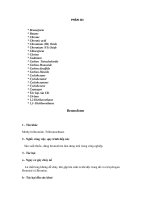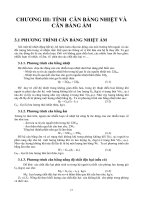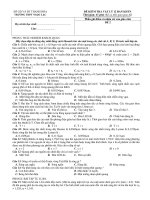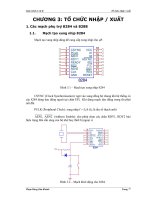3 SDFM tut1 galls axioms
Bạn đang xem bản rút gọn của tài liệu. Xem và tải ngay bản đầy đủ của tài liệu tại đây (29.8 KB, 2 trang )
fSystems Development Methods & Frameworks (COMP1648)
Tutorial 1 - Gall's Basic Systems Axioms
(Taken from: Systemantics; how systems work... and especially how they fail by John Gall
1978)
1.
2.
3.
4.
5.
6.
7.
8.
9.
10.
11.
12.
13.
14.
15
16.
17.
18.
19.
20.
21.
22.
23.
24.
25.
26.
27.
28.
29.
30.
31.
32.
Systems in general work poorly or not at all
New systems generate new problems
Systems operate by redistributing energy into different forms and into
accumulations of different sizes
Systems tend to grow, and as they grow, they encroach
Complex systems exhibit unpredictable behaviour
Complex systems tend to oppose their own proper function
People in systems do not do what the system says they are doing
A function performed by a larger system is not operationally identical to the function
of the same name performed by a smaller system.
The real world is whatever is reported to the system
Systems attract systems people
The bigger the system, the narrower and more specialised the interface with
individuals
A complex system cannot be "made" to work; it either works or it doesn't
A simple system may or may not work
If a system is working, leave it alone
A complex system that works is invariably found to have evolved from a simple
system that works
A complex system designed from scratch never works and cannot be patched up to
make it work; you have to start over, beginning with a working simple system.
In complex systems, malfunction and even total non-function may not be detectable
for long periods, if ever.
Large complex systems are beyond human capacity to evaluate
A system that performs a certain way will continue to operate in that way regardless
of the need or of changed conditions.
Systems develop goals of their own the instant they come into being.
Intra-system goals come first
Complex systems usually operate in failure mode
A complex system can fail in an infinite number of ways
The mode of failure of a complex system cannot ordinarily be predicted.
The crucial variables are discovered by accident
The larger the system, the greater the possibility of unexpected failure
"Success" or "function" in any system may be failure in the larger or smaller
systems to which it is connected
When a fail-safe system fails, it fails by failing to fail safe.
Complex systems tend to produce complex responses (not solutions) to problems.
Great advances are not produced by systems designed to produce great advances.
Systems aligned with human motivational vectors will sometimes work; systems
opposing such vectors work poorly or not at all.
Loose systems last longer and work better
Tutorial exercise
The purpose of this tutorial is to help you understand the reasons why systems fail and the
complexities involved in making them work.
In small groups
1.
Examine Gall’s Systems Axioms and identify 6 axioms which seem pertinent to
system failure.
2.
Think of some examples from your own experience of IT systems, or from things
you have read in the press, to illustrate the 6 axioms that you have identified.
3.
Be prepared to discuss your findings with the rest of the group.









